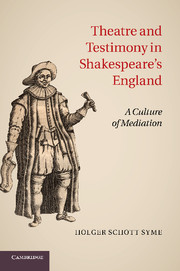Book contents
- Frontmatter
- Contents
- Illustrations
- Acknowledgments
- Textual note
- Abbreviations
- Introduction: The authenticity of mediation
- Chapter 1 Trial representations
- Chapter 2 Judicial digest
- Chapter 3 Performance anxiety
- Chapter 4 Royal depositions
- Chapter 5 The reporter’s presence
- Epilogue: The theatre of the twice-told tale
- Select bibliography
- Index
- References
Introduction: The authenticity of mediation
Published online by Cambridge University Press: 05 March 2012
- Frontmatter
- Contents
- Illustrations
- Acknowledgments
- Textual note
- Abbreviations
- Introduction: The authenticity of mediation
- Chapter 1 Trial representations
- Chapter 2 Judicial digest
- Chapter 3 Performance anxiety
- Chapter 4 Royal depositions
- Chapter 5 The reporter’s presence
- Epilogue: The theatre of the twice-told tale
- Select bibliography
- Index
- References
Summary
A man dressed in a simple black gown or an elaborate robe of office stands before a crowd of listeners. He speaks, and as his audience attend to his words they understand that the words are not his at all, but belong to another, absent voice. Continuing to listen, they begin to hear, through the conduit of the man’s body, that other voice as though its owner were speaking. And as the absent voice materializes, it conjures a world of absent events and people, meetings of kings or street brawls among drunkards, mundane business transactions or chilling encounters with the supernatural.
In analytical terms, what takes place in this scene is the substitution of a present body and voice – that of the speaking man – for an absent voice or set of voices, resulting in a representational act that diminishes the real presence of the man’s body and makes it almost less palpable than that of the voices that come to inhabit his mouth. An act of embodied mimesis results in a momentary presence effect. In historical terms, the scene depicts a transaction that took place routinely and on an everyday basis in public squares, courtrooms, assemblies of state, and theatres in Tudor and early Stuart England. The man could have been Mr Fanshawe, a court clerk, speaking the words of Richard Weston, from a document in the hand of Edward Coke, at the trial of Anne Turner in 1616; he could have been Lord Keeper Nicholas Bacon, speaking the words of Elizabeth I, from a document in either the queen’s or his own hand, in the House of Lords in 1563; he could have been Richard Burbage, speaking the words of Hamlet, from a document in either Thomas Vincent’s or William Shakespeare’s hand, at the Globe in 1600.
- Type
- Chapter
- Information
- Theatre and Testimony in Shakespeare's EnglandA Culture of Mediation, pp. 1 - 25Publisher: Cambridge University PressPrint publication year: 2011



